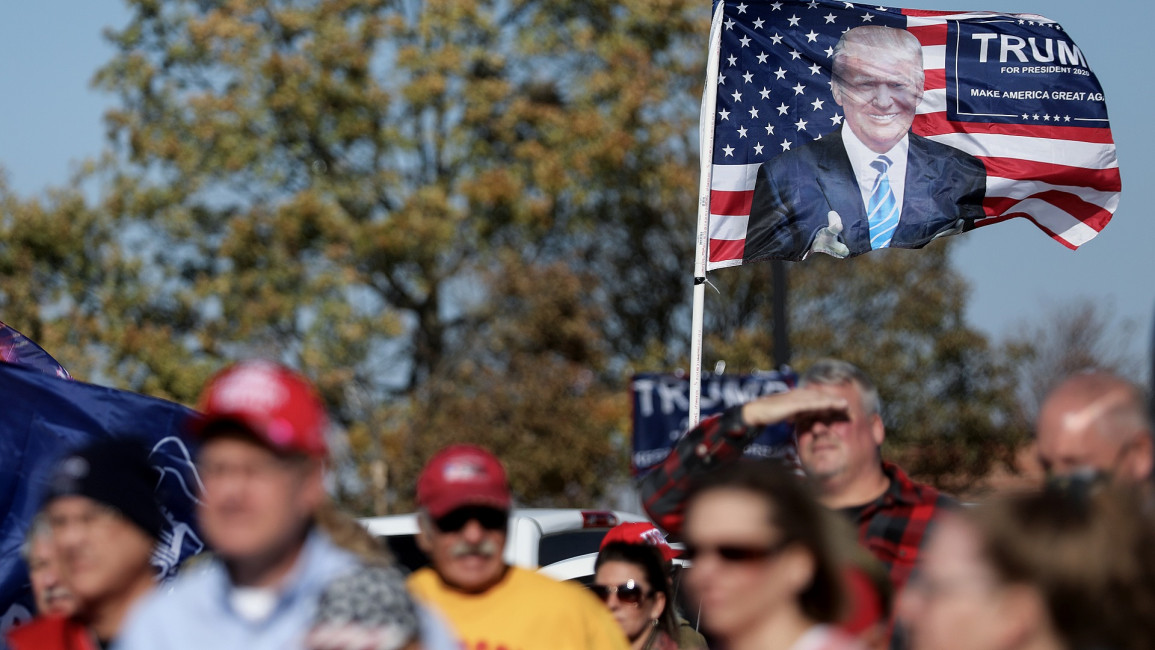Trump's sweeping victory in Iowa shows re-election potential
As former US President Donald Trump easily swept to victory in this week's Iowa Caucus, many Democrats rejoiced at the idea that President Joe Biden would likely face the opponent he defeated in 2020.
However, with the first vote of the 2024 Republican primary done, some Democrats are quick to urge caution over assuming that the same candidates as last time will yield the same result four years later.
"They should be very scared. Anyone thinking Trump is an easy target is putting themselves and the party and the White House in precarious conditions. He is the strongest candidate. Polls don't lie," James Zogby, a veteran pollster and president of the Arab American Institute, told The New Arab.
Biden will likely see an even bigger victory than Trump in Iowa, with the Democratic results expected on 5 March, as this is the first time Iowa Democrats are voting by mail. Biden is largely considered an uncontested incumbent whose Democratic opponents haven't gained any significant traction.
Though he will presumably see a much more significant victory in Iowa than Trump's 51 per cent, the lack of a real Democratic contest also means a lack of buzz and engagement for the party.
Furthermore, Trump appears to be using the same playbook as he did in 2016, when he gave unfiltered speeches, tapping into voters' economic woes, resentment over demographic changes, and general frustration over the status quo, such as the media -- this time doing so as he juggles multiple lawsuits and court appearances.
"That's been his bread and butter -- targeting these establishment entities and making them the enemy of the people," said Zogby. "It's not as if all of a sudden Trump is in trouble with all of these institutions. He turns negatives into positives. Democrats haven't figured this out."
He said, "I don't think they understand their lack of connectedness with voters: if we accuse him of just one more crime, that will be the end of it," said Zogby, referring to what he sees as a misguided Democratic mindset. As for Trump's perspective to voters, he sees it as, "You feel pain, I feel pain. When they're attacking me, they're attacking you."
Though from the other end of the political spectrum, Senator Bernie Sanders of Vermont was able to tap into voters' feelings of disenfranchisement when he ran for president in both 2016 and 2020.
This will mark a change from Biden's last White House bid, where he isn't campaigning from the comfort and distance of a computer.
Polls indicate that Biden is losing ground to Trump in key battleground states, including Michigan, where he saw strong support from Arabs and Muslims. That support has plummeted among Arab voters, from 59 to 17 per cent nationwide, with his backing of Israeli Prime Minister Benjamin Netanyahu's war in Gaza.
Though most of these voters will not likely vote for Trump, there is a strong chance many will stay home or vote for a third party, Zogby believes, which will most likely work in Trump's favour.

![The brutal assault on Khan Younis has killed dozens and displaced thousands more [Getty]](/sites/default/files/styles/image_330x185/public/2024-07/GettyImages-2162526709.jpg?h=d3eda8cf&itok=n5N-o8p5)
![Members of the Algerian delegation threw roses into the Seine [Getty]](/sites/default/files/styles/image_330x185/public/2024-07/GettyImages-2162980872.jpg?h=199d8c1f&itok=h_3o_TOL)
